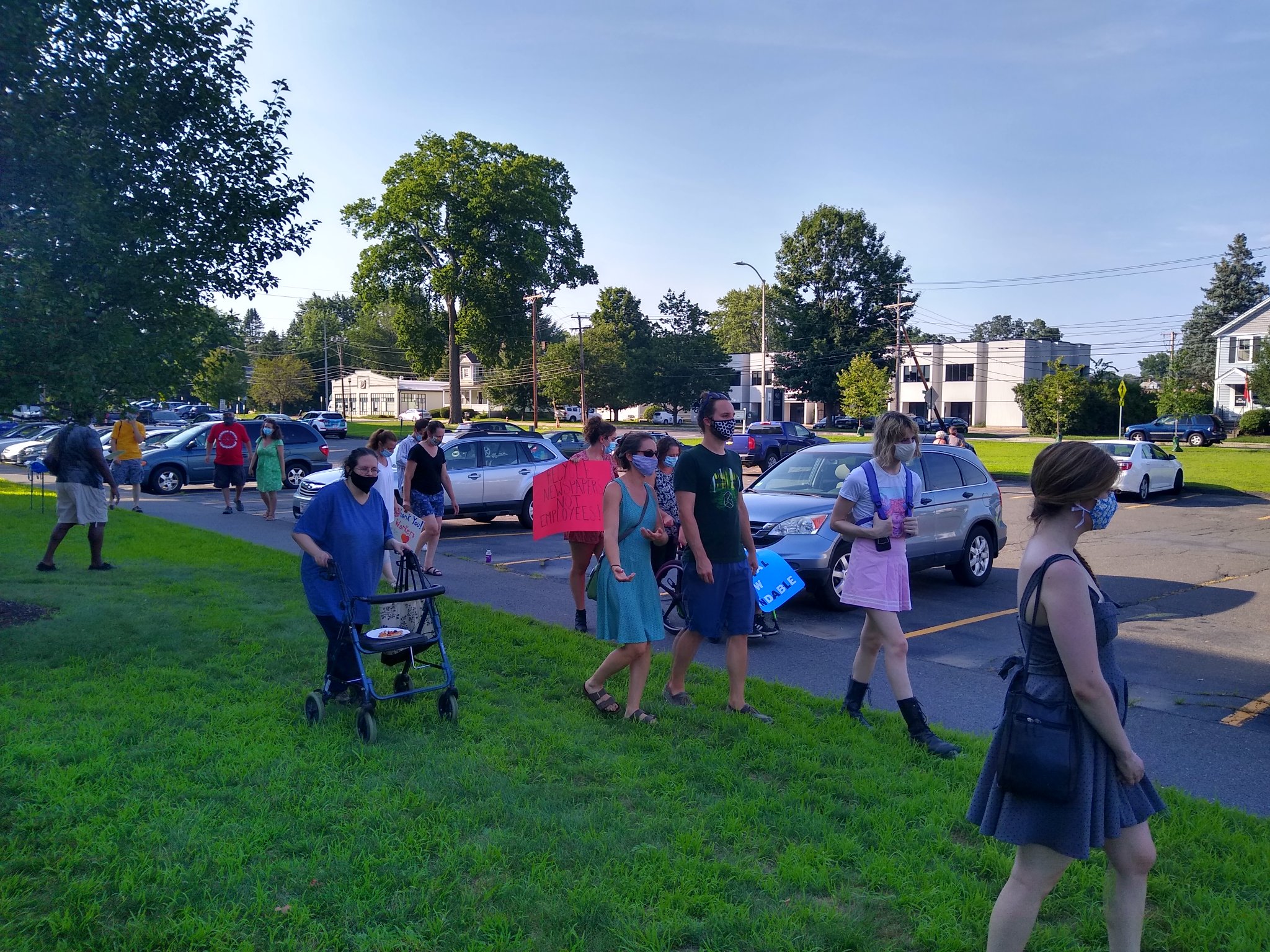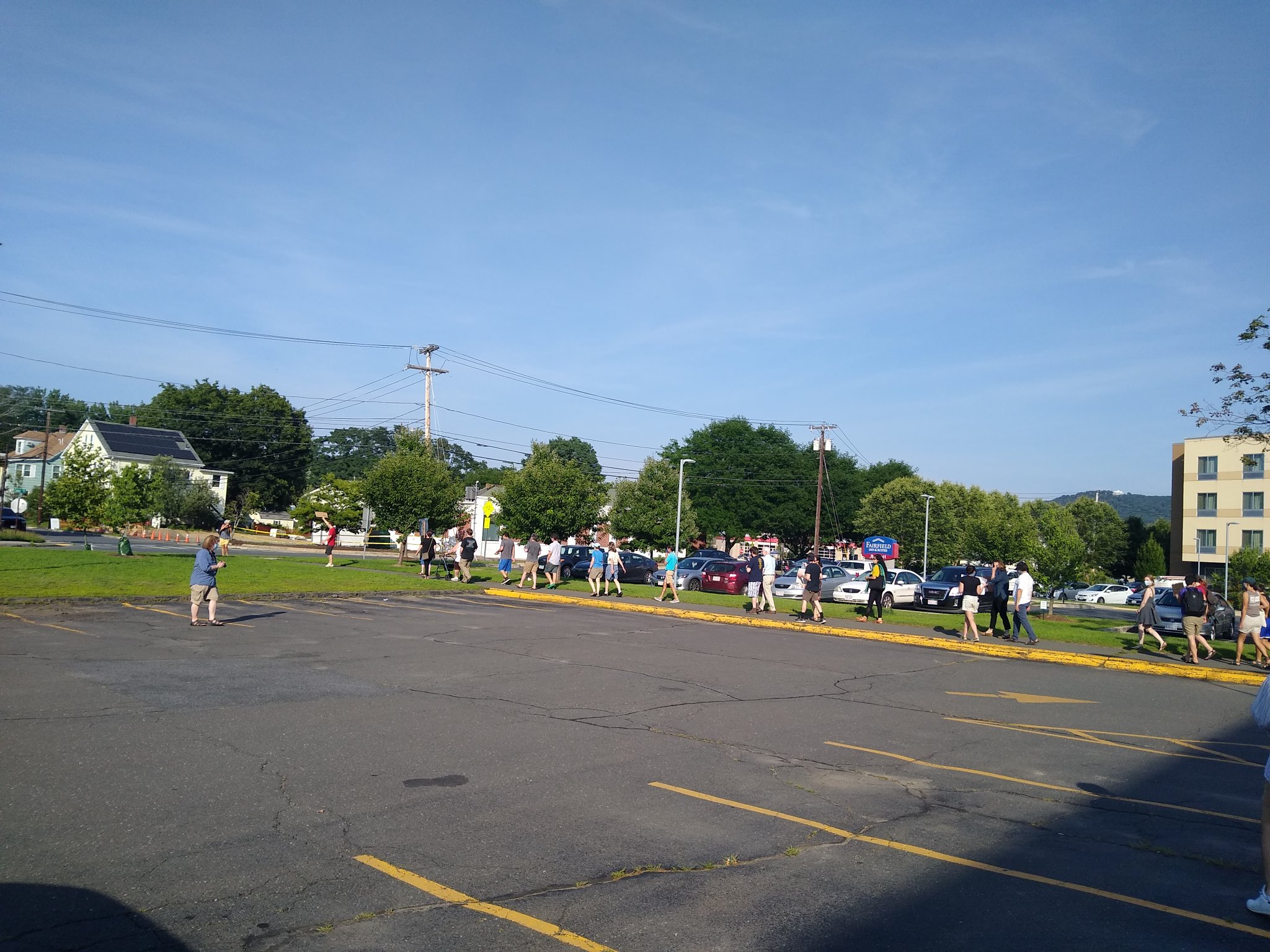Like All Things, Media in Western Mass Feel Bite of the Coronavirus…
NORTHAMPTON—On a sun-blasted afternoon in July, a mix of celebration and mourning was afoot outside the Daily Hampshire Gazette’s building. Decked out in union red shirts, staffers demonstrated in support of their imminently unemployed colleagues. The paper was closing its press, idling 29 workers, and outsourcing printing to a company in Worcester.
With the masks and social distancing, one might assume this was a COVID-induced decision. By many accounts, it was not. Yet, the pandemic had taken a bite out of Gazette workforce early in the pandemic. The press shutdown and subsequent demonstration illustrate the broader turmoil Pioneer Valley media has experienced since the coronavirus seized the world.
“We wanted to thank the hard-working people who work in this press,” said Bera Dunau, the unit council chair for the Pioneer Valley Newsguild.
However, he added, the demonstration was also a show of strength to protest what staffers felt was purely business decision. It left dozens of employees jobless during a pandemic-induced recession.
COVID-19’s impact on the press in the Valley varies. Some layoffs have happened, but furloughs seem more common. Federal programs like the Paycheck Protection Program (PPP) helped as advertising, especially for dining and the arts, disappeared into the maw of the coronavirus. Work from home is a fact of life for many if not all local journalists.
The threat COVID-19 poses to media, especially local media, is immense. In April, The New York Times reported that 36,000 journalists nationwide had been laid-off, furloughed or experienced pay cuts. While larger news organizations have had their troubles, the effect has been particularly pronounced on local news. Local news organization faced huge headwinds even before the virus. The President of NewsGuild-CWA, Jon Schleuss, has called the pandemic an “extinction-level event” for local journalism.
In the Pioneer Valley, where journalism has been in flux, the effect has been uneven across mediums.
For example, the pandemic did not prompt layoffs or furloughs at WWLP, the local NBC affiliate for the Springfield area.
“As a company, Nexstar Media Group has not engaged in any layoffs or furloughs related to the pandemic,” emailed Nexstar Chief Communications Officer Gary Weitman. The company has owned WWLP since 2016.
Meredith Corporation owns WGGB (ABC) and WSHM (CBS). Western Mass News airs on both stations. Meredith did not return requests for comment on what, if any layoffs, furloughs or other COVID-induced actions it took locally.
Meredith, which owns a host of national magazine titles, had cut pay for 60% of employees in April. It is unclear whether this included television. In May, the company reported strength in its television division, especially in terms of viewership.
New England Public Media, the fruit of WGBY and New England Public Radio’s merger, furloughed its full- and part-time staff for five days according to its president Martin Miller. Miller also took a furlough.
Some employees remain unionized employees of UMass-Amherst, which still owns the radio licenses that NEPR and now NEPM use. These employees underwent one week furloughs between June and July.
“The effect on the newsroom was a reduction in radio and online coverage during the time that the furloughs were happening for the newsroom staff (July 6-24) due to reporters and editors not being available,” Miller said in an email. Connecting Point, a public affairs television program, ran “evergreen” programs for the first week of July to mitigate the impact of staff being off.
“It’s a reminder that local, independent journalism is essential to our community and supporting the community-funded model of public media is more important than ever before,” he wrote.
Matt Szafranski, WMP&I’s editor-in-chief, has appeared as a panelist on NEPM and its predecessors’ television and radio programming.
Up in Northampton, union leaders believe the press closure was a business decision unrelated to the pandemic. Talk of its closure predated the pandemic and Gazette publisher Michael Moses has said publicly the paper’s printing press had become increasingly expensive to maintain. The Gazette’s own reporting suggests COVID-19 was a factor, but also notes lost printing business.
“This was not an exigency layoff,” Dunau said. “If it was an exigency layoff, we would have honestly had a lot less flexibility,” a reference to bargaining for press employees’ severance pay.
Moses did not respond to a request for comment. However, in his public statements he has denied the closure of the pressroom was union-busting.
The Pioneer Valley Newsguild represents employees at the Gazette, the Valley Advocate—which has suspended publication—and the Amherst Bulletin. The papers’ parent company, Newspapers of New England, has laid off more than a dozen staff across their Western Massachusetts publications, which include the nonunion Greenfield Recorder and Athol Daily News.
While COVID-related or not, the loss of the press employees stung. When the unionization drive began at the paper, one of many to sweep news organizations nationwide, support from within the pressroom was crucial. The Pioneer Valley Newsguild is a wall to wall union, representing journalists, design and advertising staff and, until July, press workers. The Guild is a sub-unit of the Providence Newspaper Guild, a NewsGuild-CWA local that represents news employees across southern New England.
Although the Guild does not yet have a contract, the Gazette and its owners must bargain in good faith with the union on COVID measures. Contract negotiations continue.
Six union staffers were laid off at the onset of the pandemic. Despite these layoffs, Dunau said his Gazette colleagues have been able to produce incredible local reporting on the pandemic, reopening and the George Floyd protests. The paper has maintained its recently expanded coverage of Holyoke and closely covered the hectic First Congressional primary.

Not just staffers from supporters from the community also participated in the Newsguild’s send-off for the presses. (WMP&I)
As the press whirred one last time inside, staffers outside gave speeches about the Gazette and thanked their pressroom colleagues. The rally concluded with a march around parking lot.
With the printing press shut down, the union is down to about 29 members. That is down from about 70 when Gazette staffers voted to unionize.
Other print outlets have had to adapt, too. The Berkshire Eagle recently announced that come October, it would print only five days a week.
“The Eagle is healthy but struggling through the pandemic like most other newspapers and news organizations are,” its President and Publisher Fredric Rutberg emailed.
In response to other questions about how COVID-19 has affected The Eagle, Rutberg referred to an article he wrote for the paper and its sister publications in Vermont.
The article outlines the fiscal stress the publications have endured. Advertising revenue fell 50% and remains 30% below the previous year’s figures. Rutberg does not blame COVID-19 entirely for the reduction in printing. Yet, he writes that it has accelerated the transition to and reliance on digital. Executives at the paper have told WAMC that digital subscriptions have surged over the past year.
The article does not discuss furloughs or layoffs, but The Eagle instituted 40-hour furloughs in March. Its parent company received a PPP loan valued between $1 million and $2 million, saving 182 jobs.
In the lower Pioneer Valley, Advance Local owns The Republican, Masslive and Reminder Publications. The Poynter Institute reported last spring that Advance imposed pay cuts of between 2% and 20%, depending on salary size. Most employees experienced two-week furloughs, too.
That is consistent with what Reminder Publications managing editor G. Michael Dobbs told WMP&I earlier this summer. He said no furloughs became layoffs and the feds’ enhanced unemployment cushioned the blow.
“It was necessary because so many businesses could not advertise because they could not be open,” Dobbs said of the furloughs.
The pandemic did not halt The Reminder’s expansion plans. Reminder Publications, which publishes regional versions of its flagship weekly, began producing an Easthampton edition in July.
The only outward change at Masslive was its solicitation for subscriptions for its otherwise free content. Once merely, the alter-ego of The Republican, the site now has its own newsroom with statewide ambitions. Tim Kennedy, Masslive’s president, did not respond to a direct message inquiring about any employment changes the site undertook beyond those all Advance publications experienced.
The exact impact on The Republican is harder to deduce. Employees definitely experienced furloughs, too, but perhaps on different terms than other Advance employees.
Unlike Masslive or Reminder Publications, The Republican has a union. Like the Pioneer Valley Newsguild, the union at The Republican represents employees inside and outside the newsroom. COVID employment changes would be subject to negotiation.

COVID’s teeth have definitely dug into The Republican, but the bite marks remain unclear. (WMassP&I)
The publisher of The Republican, George Arwady, did not return a request for comment. WMP&I was unable to reach leadership at the newspaper’s union.
While The Republican has resisted reducing its print schedule, unlike some Advance-owned properties, it has bowed to other realities. Federal union filings show plummeting staff levels, leaving unused workspace. It recently announced a marijuana startup retailer would lease space in the paper’s building in Springfield.
The Republican is not the only news organization contemplating real estate transactions during the pandemic. After its press shut down, The Gazette announced it was putting its building up for sale. However, Moses, the publisher, assured the paper was not leaving Northampton.
“The Gazette will continue to be published here, either in this facility or another one,” he told his publication.
Still, it may not be the same.

Where to from here? (WMP&I)
Amid the solidarity with their laid-off colleagues at the July 27 rally, staffers also reflected on the end of an era.
On a wall at Fitzwilly’s, a fern bar-era survivor here, is a Gazette front page trumpeting one-time Northampton mayor Calvin Coolidge’s election as president in his own right. Now it is just another memorial to the legacy of print in Hampshire County dating to the Gazette’s inception in 1786.
“Ever since then, the Daily Hampshire Gazette has been printed in this area,” one speaker at the rally lamented.



